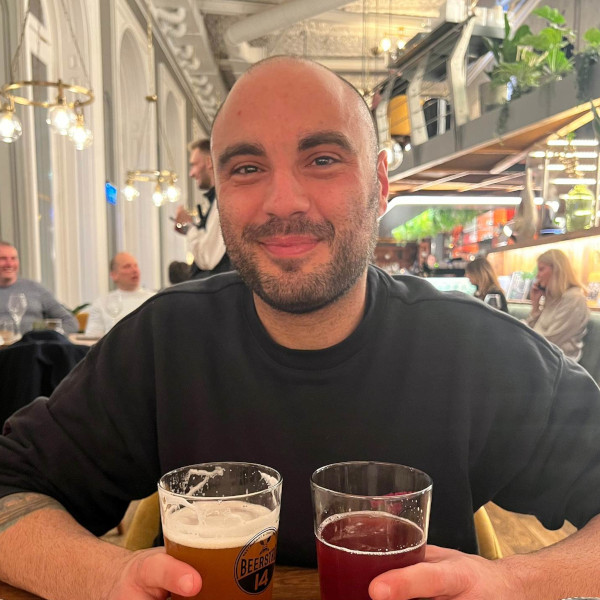Interviews with Olim
Each month, we interview an oleh or olah for our newsletter.
We invite you to read the stories of LGBTQ+ people who have made Israel their home.
"My only regret is that I didn’t move here when I was a teenager"
Interview date: March 2023
Q. Where were you born and where did you grow up?
A. I was born in Glasgow, Scotland and grew up there.
Q. At what age did you come out? And how did it go?
A. I came out as gay when I was 15. I was in fourth year of high school. I’d always been friends with the girls, not the guys. My amazing art teacher rescued me from having to do sport class any more, but I was the only gay kid in high school which wasn’t so fun, but gave me a tough skin. It didn’t go very well with my family however and I left home at 16.
Q. Were you involved at all in the LGBT community back home?
A. I was very involved actually. A few friends and I formed a gay rights organisation in Scotland called the LGBT Network and we ran the UK’s first campaign for same-sex marriage which was (eventually) passed in Scotland in 2014, despite us campaigning for it since 2007! I also volunteered for a wonderful group in Glasgow called Gay Men’s Health where I ran creative writing workshops for gay men living with HIV, and I was a board member of a national charity called HIV Scotland.
Q. What is your involvement (if any) in the LGBT community in Israel?
A. Shortly after I moved I became the Israeli representative to the European AIDS Treatment Group and I worked a little bit on the campaign to bring PrEP to Israel. I am quite involved with the Israeli AIDS Taskforce and have been becoming more involved with LGBT Olim since Corona. I love the Qulpan sessions in Jerusalem and I have been trying to get to more LGBT Olim events. I’m always at Jerusalem Pride, too.
Q. How long since you made Aliyah?
A. I moved Shavuot 2014 and have been living in Jerusalem since summer 2015.
Q. Did you move here on your own or with family/friends/significant other?
A. I came alone. I had only been to Israel twice before, once for Taglit in 2012 and then to do a programme in Tzfat called Livnot U’Lehibanot which I loved so much that I actually lived in Tzfat and worked for them for my first year after I moved.
Q. Why did you make Aliyah?
A. I was experiencing a growing amount of antisemitism at my job before I came, and even in my social life. I was always very involved in socialist politics in Scotland, and people didn’t like the fact I was visiting Israel. But also to have some sunny beach days in the winter is far better than the Scottish cold and rain, so it was a mix of push and pull factors.
Q. How is it going so far?
A. Pretty fantastic. My only regret is that I didn’t move here when I was a teenager. In 2016, I met my husband who is from Jerusalem and we still live in the city. I’m still discovering new things about Israel every day and rubbing shoulders with such a diverse mix of people means it can be hard to find a boring day here.
Q. What do you do in terms of work?
A. I’m the head of learning and content for a high tech company based in Jerusalem that does regulatory compliance software and training. Before that I was running a non-profit which connected Israeli startup leaders with Jews abroad.
Q. How is your Ivrit?
A. Much better since I have been going to Qulpan sessions. Being able to practise speaking among a friendly, non-judgemental group of people helped tremendously.
Q. What has been your biggest challenge so far?
A. Probably navigating the Israeli healthcare system. There’s a lot more bureaucracy than the UK and things don’t always run smoothly, but actually I find it far superior than the NHS [UK National Health Service] since I’ve gotten the hang of it.
Q. How do you perceive the Israeli LGBT community?
A. A fascinating mix of contradictions and unique characters. But I’ve felt welcomed and connected from the first day I came here in a way I never felt in Scotland. I’ve met some really fascinating people, and especially living in the North and then in Jerusalem, one is living on the borders, so you end up chatting with all sorts, from closeted Yeshiva boys to gay Arabs, dati gays and queer pastors, rabbis, monks and people from all the different cultures Israel is blessed with.
Q. How is being LGBT in Israel different to back home?
A. Very different. In Israel, queer life is much more dynamic, exciting and inclusive than in Scotland. Pride is shown live on TV here. Assi and Albert are on billboards in Tel Aviv. Half the country goes out to protest when our rights are threatened. There’s so much diversity in Israel anyway that people’s uniqueness is celebrated I think whereas in Scotland it can feel like being different in any way, either from mainstream Scottish society or the Scottish LGBTQ scene, can leave you very excluded.
Q. If you were making aliyah now, would you do anything differently?
A. I would definitely have gotten more involved in LGBT Olim from day one. It’s such a fantastic resource with some wonderful, warm and welcoming people and so many great events.
Zvi

Our Newsletter
Sign up if you would like to receive a monthly email listing events of interest to LGBT English-speakers in Israel, an interview with an oleh/olah and other useful information.
Want to be interviewed?
Complete the form below and we will get back to you.
Our Newsletter
Sign up if you would like to receive a monthly email listing events of interest to LGBT English-speakers in Israel, an interview with an oleh/olah and other useful information.
Want to be interviewed?
Complete the form below and we will get back to you.


